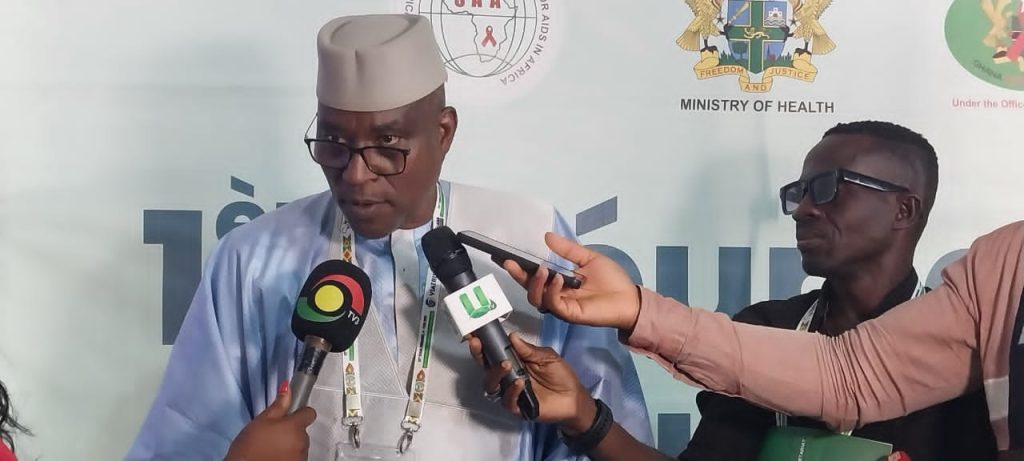By Samira Larbie
Accra, Nov 28, GNA-The Society for AIDS in Africa (SAA) has called on African heads of state to reaffirm their commitment to health and honour the 15 percent budget promise made under the Abuja Declaration.
Dr David Pagwesese Parirenyatwa, the President of SAA and the International Conference on AIDS and STIs (ICASA 2025) said this was crucial as there was no way Africa could make meaningful progress in the fight against HIV and AIDS and other diseases without a significant increase in health funding as well as commitments from African governments.
He made the call during the opening of the ICASA 2025 first International Steering Committee meeting held in Accra.
The two-day meeting seeks to discuss how to eradicate HIV and AIDS, tuberculosis, malaria, hepatitis, and other emerging and re-emerging infectious diseases.
Dr Parirenyatwa said the World Bank’s key demographic projections had revealed that Africa’s population would reach a record 1.7 billion by 2030, with 40 per cent of that population under age 15.
“How will we ensure that this future workforce is productive and able to contribute to the continent’s development if we do not have at least a basic, functional, universal health care system in place”, he quizzed.
“It is time for every African citizen to be entitled to universal health insurance, ensuring that no one is left behind. It is time we produce our vaccines and medications,” he stated.
He said this would reduce the dependence on foreign aid and pharmaceutical companies, saying “We’ve been discussing this for a long time, and it is time Africa wakes up and starts very confidently making its vaccines and medications, enough to satisfy the continent.
Dr Parirenyatwa explained that achieving the 2030 target of the Sustainable Development Goals (SDGs) was five years away and if health was not prioritized and placed at the forefront of the African development agenda, the 95-95-95 targets would not be attained despite the successes chalked by some countries on the continent.
He said all Africans needed to know their health status, adding that with recent scientific breakthroughs persons living with HIV, who are constantly on Antiretrovirals for six months would not be able to transmit to others known as Undetectable equals Untransmitable (U=U).
Pre-exposure prophylaxis, post-exposure prophylaxis, and injectable treatments are all tools available and should be used maximally in every country, to push the 95-95-95 agenda, the SAA and ICASA President added.
The meeting aims to select an appropriate ICASA logo, finalize the ICASA 2025 theme and objectives, agree on key dates and road map, review ICASA abstract titles and sub-titles,
It will also identify the best strategies for resource mobilisation, ratify the marketing and communication strategy for ICASA 2025, and propose ICASA 2025 draft plenary session topics and speakers.
Dr Bernard Okoe Boye, the Minister of Health in a speech delivered on his behalf said Ghana hosting ICASA 2025 was a commitment to ensure that it becomes a landmark conference that advances the shared goals of health equity, innovation and comprehensive care for all.
He called for the need to adopt innovative and inclusive approaches to engage all stakeholders, especially young people who were often the most affected yet least involved in these conversations.

“We must integrate the digital platforms, social media and community networks to build widespread awareness and momentum for the conference,” the Minister said.
Dr Boye said despite Ghana’s achievement in the HIV response, much needed to be done to address stigma, discrimination and disparities in access to services.
He urged stakeholders to make ICASA 2025 a turning point in the efforts to end the AIDS epidemic and ensure a future where health and well-being were within the reach of all.
The meeting, saw participants discuss critical issues including structure and management of the conference, the marketing and communication strategy and the selection of a compelling theme and objectives that reflect the current landscape of HIV and AIDS as well as STI challenges in Africa.
Dr Kyeremeh Atuahene, the Director General of the Ghana AIDS Commission, speaking on the economic gains and visibility significance of Ghana hosting ICASA 2025 said young people would be prioritized during the conference and ensure their needs were addressed.
He assured of the country’s preparedness in organising ICASA 2025, adding that a national planning committee had been set up in conjunction with the organizers for effective preparation.
The Abuja Declaration is a 2001 agreement by African heads of state and governments who pledged to commit at least 15 per cent of their annual budgets to healthcare.
The 23rd ICASA will be held in Ghana on December 3-8, 2025 and it’s expected to host more than 10,000 participants from over 70 countries.
GNA